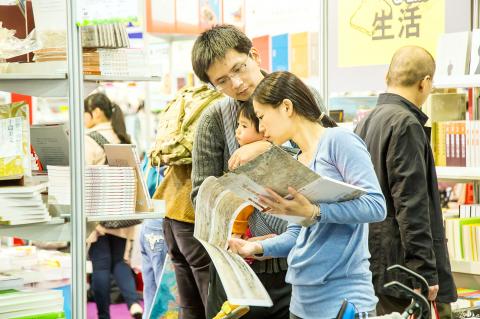People who love books and kiwis can rejoice because the Taipei International Book Exhibition opens on Wednesday at the World Trade Center — and it will be stacked with literature from the glorious alpine land of New Zealand.
Taiwanese Aboriginal literature will also feature prominently in the six-day exhibition as well.
“We want to show the richness of Taiwanese Aboriginal literature, as well as to give readers a taste of New Zealand’s literary tradition,” says Amanda Liu (劉潔妃) of the Taipei Book Fair Foundation, which hosts the fair.

Photo Courtesy of Taipei Book Fair Foundation
“Taiwanese Aboriginal people and New Zealand Maoris share a common DNA, so we hope that the book fair will serve as a communicational bridge between the two cultures,” Liu says.
The range of literature this year is vast and diverse, touching upon common historical themes, as well as contemporary issues. On both countries.
Among the authors exhibited are Monanen, a Paiwan poet whose work is featured in an English-language anthology of Taiwanese Aboriginal literature. Monanen’s poetry often touches on social and historical ills like Aboriginal children being sold into prostitution.
NEW ZEALAND LIT
The works of New Zealand diplomat-turned-author Witi Ihimaera will also be on display at the fair. The prominent Maori writer has been publishing novels and short stories since 1973. His books deal predominantly with the theme of contemporary Maori culture and social problems, much of which is inspired by his own experience growing up mixed race and gay in New Zealand.
Also featured in the exhibition is Canadian-born, New Zealand-raised Eleanor Caton, who made history in 2013 by being the youngest person ever to win the Man Booker Prize for her novel The Luminaries. The book’s 832-page plot centers around a murder mystery set against the historic backdrop of the gold mines in New Zealand, circa 1860.
Both Ihimaera and Caton will be traveling to Taiwan for the book fair.
If some of the themes seem too heavy, do not fret because the exhibition has a sizeable collection of children’s books as well.
As Liu says, “some of the book fair’s visitors are babies. We see mothers bringing their toddlers and entire families reading books together.”
‘WHITE FUNGUS’
On a somewhat related note, White Fungus magazine, in conjunction with their sister bilingual publication, Subconscious Restaurant, will be hosting a sound-art event at the Sake Factory in Huashan 1914 Creative Park (華山1914文化創意產業園區). The event, held on Valentine’s Day (Feb. 14) from 6pm to 10pm, celebrates New Zealand being the guest of honor at the book fair.
Ron Hanson and Mark Hanson, the magazine’s founders, hail from New Zealand and are thrilled to be introducing musicians from their homeland. The newest issue of Subconscious Restaurant, which contains text on the country’s musical and literary traditions, will also be released at the event.
As editor Ron Hanson says, “our New Zealand and Taiwan artistic communities are about to become united through this publication and event.”
Entry to the sound-art event is NT$300 and more information can be found at: www.facebook.com/events/955585801120842.

April 28 to May 4 During the Japanese colonial era, a city’s “first” high school typically served Japanese students, while Taiwanese attended the “second” high school. Only in Taichung was this reversed. That’s because when Taichung First High School opened its doors on May 1, 1915 to serve Taiwanese students who were previously barred from secondary education, it was the only high school in town. Former principal Hideo Azukisawa threatened to quit when the government in 1922 attempted to transfer the “first” designation to a new local high school for Japanese students, leading to this unusual situation. Prior to the Taichung First

Chinese Nationalist Party (KMT) Chairman Eric Chu (朱立倫) hatched a bold plan to charge forward and seize the initiative when he held a protest in front of the Taipei City Prosecutors’ Office. Though risky, because illegal, its success would help tackle at least six problems facing both himself and the KMT. What he did not see coming was Taipei Mayor Chiang Wan-an (將萬安) tripping him up out of the gate. In spite of Chu being the most consequential and successful KMT chairman since the early 2010s — arguably saving the party from financial ruin and restoring its electoral viability —

The Ministry of Education last month proposed a nationwide ban on mobile devices in schools, aiming to curb concerns over student phone addiction. Under the revised regulation, which will take effect in August, teachers and schools will be required to collect mobile devices — including phones, laptops and wearables devices — for safekeeping during school hours, unless they are being used for educational purposes. For Chang Fong-ching (張鳳琴), the ban will have a positive impact. “It’s a good move,” says the professor in the department of

Article 2 of the Additional Articles of the Constitution of the Republic of China (中華民國憲法增修條文) stipulates that upon a vote of no confidence in the premier, the president can dissolve the legislature within 10 days. If the legislature is dissolved, a new legislative election must be held within 60 days, and the legislators’ terms will then be reckoned from that election. Two weeks ago Taipei Mayor Chiang Wan-an (蔣萬安) of the Chinese Nationalist Party (KMT) proposed that the legislature hold a vote of no confidence in the premier and dare the president to dissolve the legislature. The legislature is currently controlled